#homophobia and heterosexism
Text

I say this as a 35 year old trans queer who has been out since I was like 12. I'm desperate for y'all not to take us backwards. liberation, not assimilation.
#liberation vs assimilation#coming out#heterocentrism#heterosexism#homophobia#internalized homophobia#queerbaiting#michael sheen#david tennant#good omens#neil gaiman#parasocial behavior#parasocial#parasocial relationships#loki#ofmd#our flag#our flag means death
99 notes
·
View notes
Link
TW!!!!!!!!!!!!!!!!
Multiple warnings. Transphobia, r----, etc.
This is outrageous, disgusting, and they need to be held accountable!
#brainwashing#religious brainwashing#Louisiana#church#conservatism#sexism#heterosexism#transphobia#homophobia#republicans#teens#teenagers#high school#sneaky#conformism
0 notes
Text
Thank you!
My ayahuasca interviews are going incredibly well so far, just need a few more. Thank you to all the gay men who have responded to my call and to all our tribe members who have connected me with these brave gay men!
‘The Impact of Ayahuasca on Gay Men’s Experience of Internalized Heterosexism”
#ayahuasca#gay men#internalized heterosexism#internalized homophobia#Self Acceptance#self love#love#equality#spirituality
0 notes
Text
Some tangible Black queer history for you!
In case you needed any more proof that we've always been here - this amazing collection is courtesy of the Stonewall National Musuem and Archive!
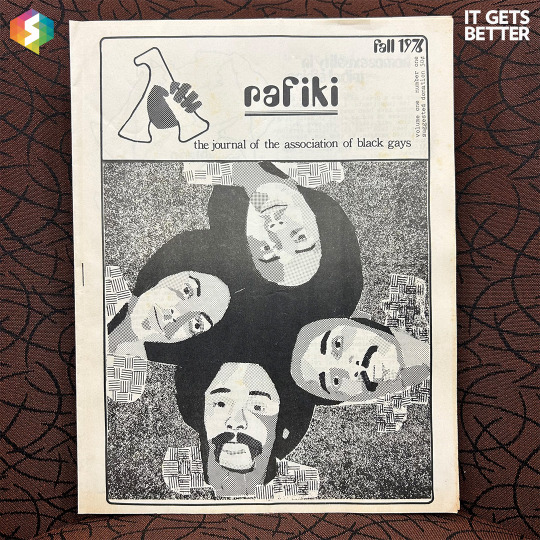
Rafiki: The Journal of the Association of Black Gays, Vol. 1 #1 (Fall 1976)
"Rafiki was a quarterly publication from the Association of Black Gays (ABG), a Los Angeles, California gay activist group that organized through education, political engagement, and grassroots activism to
improve the conditions for Los Angeles’s Black gays and lesbians.
According to the journal, the title Rafiki was chosen because it means “friend” in Swahili and “that’s what [ABG] hope to be for you.” This first issue includes an article on the history of ABG and the fact that Black gays and lesbians have been largely excluded from the political, social, and economic advances of the gay community.
Included in this issue are articles such as “Homosexuality in Tribal Africa” and “Disco Discontent” (an open letter to the owner of Studio One, Scott Forbes), as well as poetry by Steven Corbin and Frances Andrews, and book reviews. It even contains an ad for the famous Catch One Club owned by Jewel Williams, which is still
operating today!"
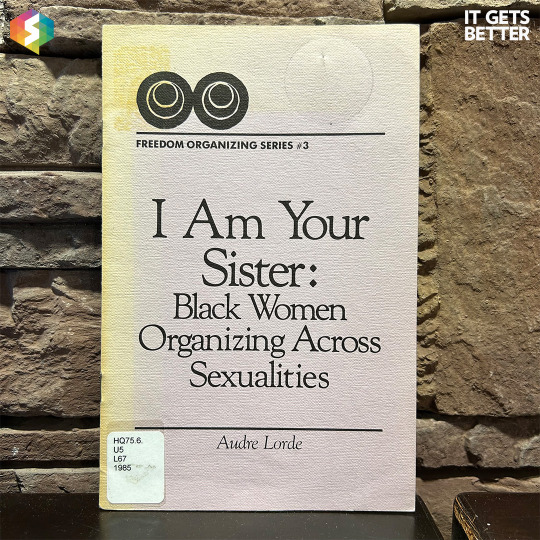
I Am Your Sister: Black Women Organizing Across Sexualities by Audre Lorde (Kitchen Table: Women of Color Press, 1985; from the Freedom Organizing Series)
You can read this one here!
"This small twelve-page publication derives from a speech Audre Lorde gave at the Women’s Center of Medgar Evers College in New York City regarding the exclusion of Lesbians in the feminist movement and how Lorde’s identity as both a Black woman and lesbian are inextricably linked.
Primarily, heterosexism and homophobia are major issues Lorde states are “two grave barriers to organizing among Black women.” Lorde ends the essay with the statement: “I am a Black Lesbian, and I am your sister.”
Her emphasis on the duality of this identity stems from a 1960s poster that said “He’s not black, he’s my brother!,” which Lorde states infuriated her because “it implied that the two were mutually
exclusive.”
Kitchen Table: Women of Color Press was founded by Barbara Smith—another Black Lesbian feminist—and Audre Lorde in 1980 to create a publishing apparatus for women of color who at the time did not have control over how they were published except through the white-dominated outlets."
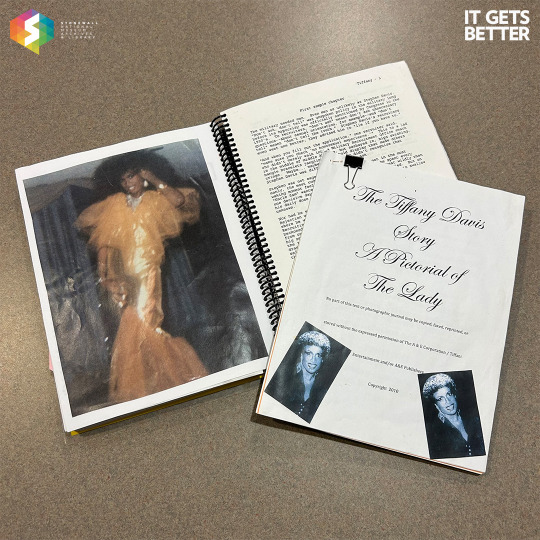
Flawless! The Life & Times of T.B.D.J. AKA Tiffani Inc. AKA Mrs. … (Manuscript) by Tiffany Bowerman (July 2007, A&E Publishers)
This autobiographical manuscript traces the life of Tiffany Bowerman aka Tiffany B.D. Johnson (b. 1959), who states that she “was the first African-American Transsexual to have state issued birth certificate reissued [1990]… was the first to legally marry three different active duty military men… [and] first… to found their own Christian Denomination… The Agape-Ecumenical Christian Denomination.”
Further, she states “I have tried to put together something striking and original[,] a journey from childhood to self aware adult. A life that was and is with all regrets included.”
This manuscript is a preliminary copy of a rough draft, and contains various memoirs, photographs, legal documents, and ephemera.
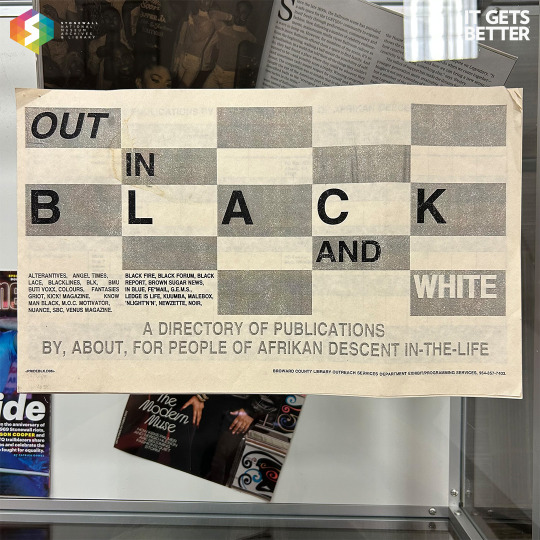
Out in Black and White: A Directory of Publications By, About, For People of Afrikan Descent In-The-Life by the Broward County Library Outreach Services Department Exhibit/Programming Services with direction by Eric Jon Rawlins (January, 1996)
Out in Black and White is a directory of various serial publications (magazines, newsletters, journals, etc.) throughout the United States that are focused on the Black LGBTQ experience. According to the directory, “[t]his project was inspired by the atmosphere of strength, oneness and productivity created by the Million Man March [on October 16,] 1995.”
The Million Man March was a political demonstration that took place at the National Mall in Washington, D.C. with the purpose of encouraging involvement in the improvement of the conditions of African Americans. Eric Jon Rawlins was a Broward County, Florida librarian who at one time was also the second vice president of the NAACP Fort Lauderdale branch in the late 1980s.
Currently, the Eric Jon Rawlins Collection consisting of personal and professional papers, as well as his 6,000 vinyl record album collection, are housed at the African American Research Library and Cultural Center Special Collections in Broward County, FL.
#it gets better#black history month#bhm#black trans lives matter#lgbtqia#queer history#lgbtq history#black history#queer archive#queer lit#studyblr
103 notes
·
View notes
Text
I do believe fiction affects reality - I believe that porn tropes have done irreparable damage to how people view sex, I believe popular TV-shows aimed at teenage girls have done their fair deal in women thinking of abusive relationships as desirable, I believe religious literism has turned many people cruel and unwilling to learn, I believe that every major show and movie portraying the past as ethnogenic has fooled millions, I believe that mainstream movies with animal antagonists and misinformation caused horrific harm to those animal species, I believe that war movies constantly manages to glamorise war and being a soldier even when they try to be antiwar, I believe heterosexism is so prevalent in media around us that children will learn gender norms even if it's nothing like their personal experiences, I believe the success of The Silence of Lambs caused transgender people so much harm despite literally saying in the movie that transgender people aren't dangerous and the antagonist isn't actually transgender but affected with internalized homophobia because the wide masses that watched the movie did predominantly not have enough knowledge and good faith to understand what that means
...I don't believe niche fan content affects much of anything. The reach is so much smaller, and more importantly, aimed only at those who look for it and know to look at it critically. Disturbing things processed in safe ways, even if it sometimes involves sexualizing, are necessary to develop a healthy mind and coping mechanisms. It might not be the way that works for you personally, but people are drawn to tragedies for a reason. We want to explore the harm done by the very worst of humanity without actually being part of it.
What very much 100% does affect people is bullying and trivialising serious accusations and telling people to kill themselves.
94 notes
·
View notes
Note
hi wawa! hope this isn't a weird question, but do you know if trans people are generally accepted by their communities in mainland china nowadays? i myself am not chinese, but i do hope that my trans chinese brothers and sisters are living safe and happy lives in their country/communities.
Transgenderism is not as widely understood atm from my understanding but in recent years it has gotten more exposure, especially transwomen. Obviously people in the LGBT+ community are more knowledgeable about trans identity.
As to safety and happiness, like in most places globally, it depends on a trans person's socio/economic status and network of support;
Jin Xing, a famous TV personality/host and dancer, for example, is extremely popular and well-liked (even among older generations), and is openly trans. However she has had celebrity status for most of her life, being that she was a soldier and then dancer in the People's Liberation Army Dance Academy. There are multiple trans(woman) internet celebrities that I've seen who have a lot of fans as well, who can drown out detractors.
But if you're poor and/or don't have a support network, it's undoubtedly a tough existence. There is a relatively well-known documentary that came out a few years ago, The Two Lives of Li Ermao, that documents the struggles of a transwoman. It is rather grim but it sort of gives you a peak into one person's life dealing with social pressure and financial struggle.
Aside from that, I think, it is getting better in some ways in terms of visibility/exposure (leading to awareness and the possibility of social support), but there are other policies in medicine and broadcasting that are also making things more difficult. And it's not exactly rainbows and flowers for trans people anywhere, either, so idk what you expect there. Legally, there are no laws specifically discriminating against trans people but there are also few anti-discrimination laws, so unless China passes major LGBT law reforms, it's a social issue that gets neglected and left to wither in a gray area, often under the pretense of dealing with more important matters.
Some other articles if you're interested:
Public Opinion of Transgender Rights In China (the survey sample is pretty low but it's still worth a look)
China’s ‘Anti-Sissy’ Campaign Unleashes a Wave of Online Transphobia
Less political, more personal: The many struggles of China’s transgender population
Straightly Chinese: The Emergence of Systemic Homophobia in China (< I have linked this on my blog before and it is not specific to transgenderism but I think it provides a good insight into how the status quo of heterosexism and by extension, cissexism, is maintained in China, as well as perhaps, other Asian countries)
195 notes
·
View notes
Text
I have been wondering a lot what the "point" is of homophobia towards gay men specifically. It's not that this makes it worse or more wrong, but in any other form of persecution, one group materially benefits at the direct expense of another (said benefits are unevenly distributed, of course). It "makes sense" from the cruel point of view of someone who reaps a clear benefit. So if heterosexism is the "romantic arm of patriarchy," used to control women's labor through marriage, what do men stand to gain from denying themselves outlets of pleasure? ("Homophobia got you missing out on some good head," etc.) People joke, "if you hate women so much, why not just have sex with men." Historically, some societies basically took this idea seriously! Idk. Maybe the legitimacy of straight masculine claims to power depend on having not only an "other," but inventing an "other within."
93 notes
·
View notes
Text
“Sexual desire is not the only dimension of the homosexual experience, but it is the core of that experience. It is sexual desire and acting upon that desire that puts the homosexual into conflict with dominant power structures. It is where we must begin. How does one dramatize homosexual desire? Can one represent desire without words? One can ‘force on’ the audience sexual acts, kissing, embracing, looking. Or one can enact those opposites which have also been central to the experience of many homosexuals: not looking, not kissing, not embracing. Or one can enact the cause of these negations: heterosexism, which can be dramatized by acts of brutality, acts that sometimes result from the negation of one’s homosexual desire.
One of the more interesting aspects of homophobia is, as Richard Mohr points out: “People in general find gay love—kisses of parting at the train station and the like—sicker even than gay sex.” The sight of two men kissing on the lips can evoke enormous fear and hostility in some audience members. Anyone who sat in a movie theater when Peter Finch and Murray Head kissed in Sunday, Bloody Sunday (1971), or Michael Cane and Christopher Reeve kissed on Deathtrap (1982), or when Harry Hamlin and Michael Ontkean kissed in Making Love (1982), will remember the audible, hostile response such images provoked. Everyone knows that sex between men happens, but the sight of two men kissing is often seen as a transgression of the gender order, taken by many to be ‘natural.’ A kiss is a sign of affection, of love, not merely of lust. A kiss, to paraphrase the old song, isn’t just a kiss. Hence it’s theatrical power.”
—John M. Chum, Still Acting Gay
#this is obviously explicitly about dynamics for gay men#if anything gay women have the opposite problem#I also think there’s a distinct acceptance of gay men’s affection now within liberal culture#if it’s mimicking traditional heterosexual narrative arcs#which is not to say that those arcs are inherently evil but#just that we might not have opened up our minds as much as we like to believe
38 notes
·
View notes
Text

Queering Ecological Politics
“The articulation of sexuality and nature [can be used] as a form of eco-sexual resistance” (21). Gay urban culture, at least according to mainstream media, is tied to lifestyle consumerism. Social acceptance comes not because of queerness but because queers are good consumers.
The editors argue that we must reorient our politics towards a queer ecological perspective; “a transgressive and historically relevant critique of dominant pairings of nature and environment with heteronormativity and homophobia” in order to counteract the “environmentally disastrous (and often ethically void) lifestyle consumerism” (22) we feel trapped in.
Queer ecology then offers “new practices of ecological knowledge, spaces, and politics that places central attention at challenging hetero-ecologies from the perspective of non-normative sexual and gender positions” (22). The editors then demonstrate how (queer) literature has been used to challenge ideas of heterosexuality as natural by positioning same sex relationships as innocent/natural and heterosexuality as the thing that needs to be ‘learned’. There has been a lot of work done within environmental literature with queer ecology but also in these same oft hetero-naturalized parks.
Many gay men (and other queers) have used public green spaces to ‘cruise’. These spots have also been impetus for community activism. “Shortly after the 1969 Stonewall riots in New York, a popular cruising area in Queens, Kew Gardens , was destroyed by extensive tree cutting. ‘Within a week…there were public actions showing conscious visibility, and the first gay liberationist environmental group, Trees for Queens, was formed to restore the park” (Ingram, 1997a, 47) (27).
When we consider environmental politics through issues of race, gender, and sexuality we expand the understanding of ‘what counts’ as an environmental issue; when viewed from a queer, feminist, anti-racist perspective, the environment is understood as “where we live, work, play and worship” (2004, 1)(27).
Greta Gaard’s article ‘Toward a Queer Ecofeminism’ (1997) is one that I plan on also reading and summarizing. But the main points that are made are, “Western culture’s devaluation of the erotic parallels its devaluations of women and of nature’ and “queers are feminized, animalized, eroticized, and naturalized in a culture that devalues women, animals, nature and sexuality” (29).
Gaard emphasizes the concept of ‘erotophobia’ as a bridge between heterosexism and ecological degradation, and it opens the door to considering environmentalism as sexual politics, “as a form of aesthetic and corporeal struggle against the disciplinary logics of heteropatriarchal capitalism” (29).
Queer Ecology then involves the ‘opening up of environmental understanding to explicitly non-heterosexual forms of relationship, experience, and imagination as a way of transforming entrenched sexual and natural practices towards simultaneously queer and environmental ends” (30). All the chapters/articles in the remainder of the book should share this fundamental supposition: “scrutinizing and politicizing the intersections between sex, and nature not only opens environmentalism to a wider understanding of justice, but also deploys the anti-heteronormative insistences of queer politics to potentially more biophilic ends than has been generally imagined”(30). The editors finally dedicate the remainder of the introduction to laying down the upcoming chapters, which I do not feel the need to summarize as I will probably end up summarizing most of them eventually.
#environmentalism#environmental justice#environmental politics#queer theory#queer ecology#heteronormativity#queer politics#anti capitalism#trees for queens#intersectionality#ecofeminism#critical ecology
15 notes
·
View notes
Text
From “There Is No Hierarchy of Oppressions”
I was born Black, and a woman. I am trying to become the strongest person I can become to live the life I have been given and to help effect change toward a liveable future for this earth and for my children. As a Black, lesbian, feminist, socialist, poet, mother of two including one boy and a member of an interracial couple, I usually find myself part of some group in which the majority defines me
as deviant, difficult, inferior or just plain "wrong."
From my membership in all of these groups I have learned that oppression and the intolerance of difference come in all shapes and sexes and colors and sexualities; and that among those of us who share the goals of liberation and a workable future for our children, there can be no hierarchies of oppression. I have learned that sexism and heterosexism both arise from the same source as racism.
"Oh," says a voice from the Black community, "but being Black is NORMAL!" Well, I and many Black people of my age can remember grimly the days when it didn't used to be!
I simply do not believe that one aspect of myself can possibly profit from the oppression of any other part of my identity. I know that my people cannot possibly profit from the oppression of any other group which seeks the right to peaceful existence. Rather, we diminish ourselves by denying to others what we have shed blood to obtain for our children. And those children need to learn that they do not have to become like each other in order to work together for a future they will all share.
Within the lesbian community I am Black, and within the Black community I am a lesbian. Any attack against Black people is a lesbian and gay issue, because I and thousands of other Black women are part of the lesbian community. Any attack against lesbians and gays is a Black issue, because thousands of lesbians and gay men are Black. There is no hierarchy of oppression.
I cannot afford the luxury of fighting one form of oppression only. I cannot afford to believe that freedom from intolerance is the right of only one particular group. And I cannot afford to choose between the fronts upon which I must battle these forces of discrimination, wherever they appear to destroy me. And when they appear to destroy me, it will not be long before they appear to destroy you.
-Audre Lorde
From Homophobia and Education (New York: Council on Interracial Books for Children, 1983)
#audre lorde#intersectional politics#black rights#queer rights#feminism#queer stuff#and when they appear to destroy me it will not be long before they appear to destroy you
15 notes
·
View notes
Text
I often take for granted that i spent YEARS learning the basics (and i mean the basics) of power and oppression. i had to learn because i was a dialogue facilitator about these conversations (white supremacy and racism, patriarchy and misogyny, heterosexism and homophobia). I aint no where near sophisticated and i still have a lot to learn. but some of the concepts i see the average person struggle with leaves me baffled.
i kinda think we need more of these basic 101 talks again. but i lost all patience (or maybe i never have any). how many times do we have to go over a concept i've discoursed(legit discourse, not derogatory) to death in 2012? especially if the concept is rooted in my humanity??? AHCK
#i would love to do it again#but got the emotional toil#it'd be different if it didn't affect me#but i'm not well versed (yet!) on topics i hold privilege#guess it's to the books for me#moon
12 notes
·
View notes
Photo

Hi, I’m whyeverr. I’m a sagittarius and my pronouns are she/her. I’ve been playing The Sims since 2001. I’m into elaborate builds, complex characters, and vanilla-ish / CC-minimal gameplay.
Currently playing Rebuild A City (Post-Apocalyptic BACC)
read the latest chapter | catch up from the beginning
Ask | Builds | Resources | Sims 4 Gallery | Pinterest
I block bot accounts and empty accounts that look like bot accounts.
My builds and story posts sometimes contain adult themes. I use content warning tags (e.g. #cw: nudity) for anything I anticipate some viewers may find triggering. Please message me if there’s a content warning tag I’m not using that you’d like me to include.
Racism, sexism, heterosexism/homophobia, transphobia, ableism, anti-fat bias, and other hateful views are not welcome here.
71 notes
·
View notes
Text
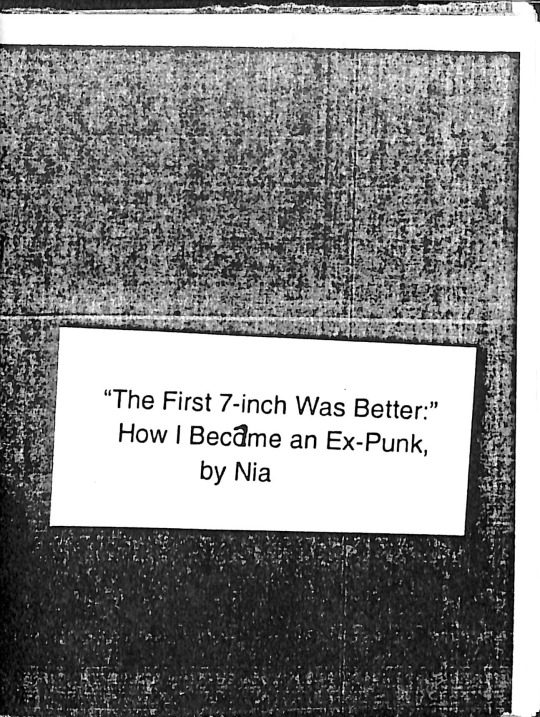

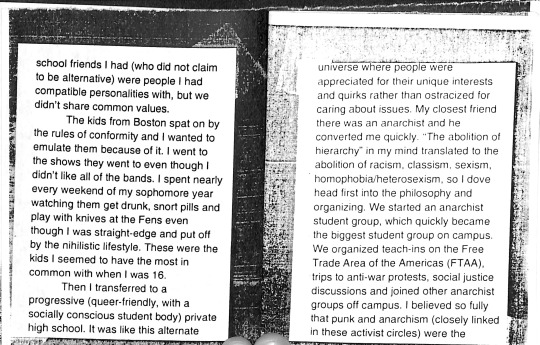

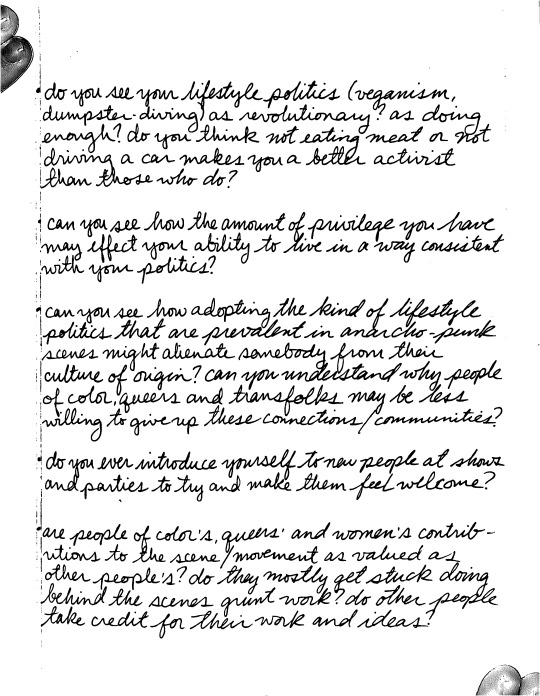
Fanzine Friday #5: "The First 7-inch Was Better:" How I Became an Ex-Punk (2008) by Nia. From our website:
Activist Nia Diaspora [aka Nia King] writes about her disillusionment with the punk scene and her subsequent embrace of the queer community. She writes about issues of exclusion and competition, particularly in terms of her mixed race, pansexual identity. As a Boston local, she writes about the Boston University bioterrorism lab, red/black anarcho-syndicates and anarcho-punks, Food Not Bombs, and several East Coast punk bands including Witchhunt and Choking Victim. Describing crusty punk activities and fashion like dumpster diving, piercing, train hopping, dreadlocks, and not showering, King is critical of the movement and gives options to others mired in what she sees as a white, misogynist, homophobic culture.
In addition to the 18-page zine, our collection has a two-sided paper asking questions for activists to consider when making their "scene" inclusive and intersectional. A transcript of the included pages is below the read more.
The Browne Popular Culture Library (BPCL), founded in 1969, is the most comprehensive archive of its kind in the United States. Our focus and mission is to acquire and preserve research materials on American Popular Culture (post 1876) for curricular and research use. Visit our website at https://www.bgsu.edu/library/pcl.html.
Transcript:
I went to a punk show last night to pick up some zines from a friend. He asked if I intended to stay, and I replied jokingly, "Naw, I'm don't (sic) think I'm tough enough to roll with the punks anymore."
"Why?" his friend, standing with us, asked. "What to you think is going to happen?"
I was fifteen when punk first drew me in. Like many punks, I grew up in the suburbs, a middle-class, white, homophobic, predominantly Irish Catholic town outside Boston. I knew that I was different, but at the time I didn't attribute it to being queer or mixed race, I just knew that I didn't fit in.
After trying for years to be accepted and failing, I began asserting my difference by sewing patches on my clothing, dying my hair and expressing [next page] distain for those who conformed to the dominant culture, who thought they were better than me.
I probably wouldn't have stayed a punk if it was all about fashion or proving I was different, but I found community through the music scene. When I turned 16, I started making trips to Boston by myself, and made a lot of friends who were punks. I felt like I had more in common with them than the kids I went to school with. They were against the war, which meant a lot at the time. I'd put up fliers for anti-war rallies in my school only to have them ripped down. The "alternative" kids at school (read: wore a lot of black and smoked a lot of pot) I played hackey-sack with became openly racist when the war with Afghanistan became imminent. The [next page] school friends I had (who did not claim to be alternative) were people I had compatible personalities with, but we didn't share common values.
The kids from Boston spay on by the rules of conformity and I wanted to emulate them because of it. I went to the shows they went to even though I didn't like all of the bands. I spent nearly every weekend of my sophomore year watching them get drunk, snort pills and play with knives at the Fens even though I was straight-edge and put off by the nihilistic lifestyle. These were the kids I seemed to have the most in common with when I was 16.
Then I transferred to a progressive (queer-friendly, with a socially conscious student body) private high school. It was like this alternate [next page] universe where people were appreciated for their interests and quirks rather than ostracized for caring about issues. My closest friend there was an anarchist and he converted me quickly. "The abolition of hierarchy" in my mind translated to the abolition of racism, classism, sexism, homophobia, heterosexism, so I dove head first into the philosophy and organizing. We organizes an anarchist student group, which quickly became the biggest student group on campus. We organized teach-ins on the Free Trade of the Americas (FTAA), trips to anti-war protests, social justice discussions and joined other anarchist groups off campus. I believed so fully that punk and anarchism (closely links in these activist circles) were the [end of text].
[printed questions - all in lowercase]
check yrself! (sic)
these questions are intended to start conversation and help you identify ways your scene may be alienating and problematic. it is by no means comprehensive.
is the activism you partake in led by those most impacted by issues you are organizing around? are you organizing on someone else's behalf uninformed by their true needs and experience?
do you favor high risk tactics which leave less privileged folks vulnerable to arrest, deportation and police brutality? did they consciously choose this risk, or did you expose them to it? do you have a plan or a legal fund to help take care of them and their families or dependents if they are detained?
do you believe your organizing tactics are the "right" ones? do these tactics contribute to long term systemic change? are they effective, or do you do them because they allow you to feel like you are doing something / prove you care about the issues despite their ineffectiveness?
[next page]
do you see your lifestyle politics (veganism, dumpster diving) as revolutionary? as doing enough? do you think not eating meat or not driving a car makes you a better activist than those who do?
can you see how the amount of privilege you have may effect your ability to live in a way consistent with your politics?
can you see how adopting the kind of lifestyle politics that are prevalent in anarcho-punk scenes might alienate somebody from their culture of origin? can you understand why people of color, queers and transfolks may be less willing to give up these connections/communities?
do you ever introduce yourself to new people at shows and parties to try and make them feel welcome?
are people of color's, queers' and women's contributions to the scene/movement as values as other people's? do they mostly get stuck doing behind the scenes grunt work? do other people take credit for their work and ideas?
29 notes
·
View notes
Text
Hello!
Hi! I'm Berry(29F, she/her), I've been playing the Sims since TS1 days. I'm into building and creating sims, but I sometimes post the occasional story bit. I do tag everything I post, but it's still a work in progress.
I follow back from my main account - aeromantica
WCIF-Friendly
NAVIGATION
everything I posted, no reblogs/tzr
story posts
downloads
resources
Racism, sexism, heterosexism/homophobia, transphobia, ableism, anti-fat bias, and other hateful views are not welcome here.
7 notes
·
View notes
Text
"In queer film criticism, mainstream cinema has long stood as the culprit in distasteful and harmful depictions of LGBT people. To many critical and scholarly accounts, its history is laden with ruthless Hollywood directors and executives sensationalizing or censoring sexuality and gender variance. Accordingly, Hollywood and other mainstream industries made films littered with the vilified stereotypes of the helpless pansy, the prurient lesbian vampire, the self- loathing and confused closet case, the insatiable bisexual, and the depraved transsexual. And as one might assume, their narrative
outcomes were almost always bleak. That is, of course, if the film could even get away with explicitly representing queerness instead of just alluding to or encoding it, as was the case during the Hays Code years. For critics and scholars, these texts reflected an oppressive culture determined to malign queers. The result of these depictions, it has been argued, is to help construct or reinforce harmful ideas and, for queer spectators, to produce feelings of self- disgust and inadequacy. It is in this way that trauma and harm— both self- inflicted and motivating hate in others— get centralized in queer film scholarship that charts non-avant-garde histories pre–New Queer Cinema.
(...)
In its affective politics, much scholarly queer film historiography begins to look, as Sedgwick would put it, quite “paranoid.” After all, the narrators of this history meet Sedgwick’s criteria for paranoid readings: to anticipate an object’s harm; to have faith in the ideological exposure, demystification, and decryption of its harm; and to generate others’ analogous participation by way of making paranoia teachable and mimetic. I want to stress that Russo is not the only paranoid reader in this historiography, notwithstanding
his resounding influence. Reading queer cinema scholarship through the years reveals that pleasure is too often taken as suspect. The default starting point is frequently homophobia, heteronormativity, and heterosexism, the scholar then positing how these problematically structure viewer desire and identification. Further, from gender studies to film studies courses, the 1995 documentary The Celluloid Closet (Rob Epstein and Jeffrey Friedman) continues to be a mainstay of queer film pedagogy. The film version, like the book, enjoins its readers to adopt a certain kind of interrogative practice that takes representation at face value. This becomes a teachable narrative with a cogent argument and streamlined thesis about queer film history. Epstein and Friedman’s documentary, Heather Love suggests, echoes Russo’s aim to chart what she provisionally calls the “trauma of queer spectatorship.” Love, however, shrewdly observes that something felicitous happens in translation from book to screen. Although it follows the overall structure of the book, the documentary version of The Celluloid Closet (1995) supplements Russo’s narration with a polyphony of voices— ranging from scholarly expertise to personal anecdote— from critics, actors, and directors who all have close relationships to the queer films cited. Love writes, “[T] he use of interviews creates the atmosphere of a group screening, in which knowing subjects speak over and against the images we see on the screen and also drain them of their pathologizing force.” Love here pinpoints how the documentary functions as a (conscious or not) reparative modifier to Russo’s severe approach, lending other viewpoints and positions to a queer spectatorial past. Such voices, I would agree, mitigate the perceived trauma of queer spectatorship by giving necessary voice to negative affects and by restoring the place of pleasure, awkward and shameful as it may be at times. Take, for example, Harvey Fierstein’s bashfully revealing his love for and identification with the stereotype of the sissy; or recall Susie Bright relishing Mrs. Danvers’s fur fetishism in Rebecca (Alfred Hitchcock, 1940). By including clips from and romantic montages of different queer films, or even films with sparse queer moments, the documentary tacitly sidesteps Russo’s line of argumentation, thereby enacting a form of reparative historicizing that subordinates— in moments— trauma to pleasure. It brings to bear the alternate histories, where structures of multiple feelings are brought to the fore."
Marc Francis, For Shame!: On the History of Programming Queer Bad Objects
20 notes
·
View notes
Note
Hello. I asked if you still gave advice sometime ago. I had some problems with internet connection and only saw your answer now.
I have no experience with girls, and I worry because, when it comes to sex, I'm really insecure. I have this idea in my mind sex between a guy and a girl is better and nothing I can do with anyone can compare. It's not really the mindset of competitiveness, much less wanting to be better, but, at least, equal. I think I see lesbian sex as inferior, in a way, as missing something, as I always hear. My friends said themselves, what women have, men also do, but they also have something we don't, so I just kind of feel I'm lacking when it comes to pleasuring a woman. And I know no lesbian would prefer a man to a woman, but I always think that if dildos and the alike were off the table, my partners would enjoy sex more if they could be with a man. I don't know how prevalent strap-ons and dildos are among lesbians, nor if they are always used among people who like it or if they just come out sometimes, but the impression I have of them is as the main thing, the most pleasurable and intimate, and one that most women will require, although I recognize I can't really know that, due to my lack of experience. I don't want to use them at all, but I'm worried about that too. Does that tend to be important for lesbians, or is that something that would be missed? I can't ask about everyone, because exceptions always exist, but, for most of us, is it like that?
I remember following your blog years ago, and you were always very kind. I had never asked anything, but the answers helped me still. Thank you.
Okay, warning to all that this will have a lot of juicy sex talk.
You’ve fallen into a very easy patriarchal ideological trap around sex that is central to both misogyny and homophobia. The idea is this: women’s bodies and sex organs are vessels, men’s bodies and sex organs are the active force. Women have sex enacted upon them; men elevate things from the erotic and the sensual to the sexual. This isn’t because of anything you’ve done wrong; the patriarchy tries to teach us this every day.
The idea that women are incomplete men is not a new one, and I have heard this repeated many times around sex in different ways with outright homophobia (“lesbian sex isn’t real sex”), heterosexism (“Lesbian sex is just foreplay”) and liberal good intentions (“lesbian sex is all the sweet parts of sex that straight men miss and we can all learn from lesbians”). This is what your friends are saying. But it isn’t that men are like women with “something extra”. What they have is something completely different (and, to the lesbian mind and taste, something deeply inferior).
I have thought a lot about what to tell you and what I keep coming back to is this: when you have your fingers curled inside another woman, she feels warm and soft and you can feel—pounding with excitement—her pulse through her vagina. The vagina is a muscle that squeezes and draws you in closer when a woman is excited. What could possibly be elevated by this experience by the inclusion of anything else? Is this experience, if one woman feeling the pulse of another woman through her most intimate parts, not on its own a divine expression of sexual actualization?
The fact is that there are a bunch of people in the world that might be stronger, faster, more fit, more traditionally attractive, more well off, more put together, more whatever than I am. But if the woman I am having sex with cares about me, she isn’t thinking of anyone who is any of those things. She’s thinking of me. Because someone who compares you to other possibilities during the act of sex is not someone you want to be with anyhow.
When it comes to straps and dildos… I have to admit that I also thought that they would be more prevalent than they turned out to be in my sex life as an adult. They have never been the main dish or the requirement. The fact is, you ultimately don’t need anything for sex other than two people, and often anything else is just in the way or for occasional fun. It’s completely okay to never use them. Many lesbians prefer this (actually, many of my exes directly preferred no penetration at all).
Frankly, I think that the phallocentricity of how our society views sex is violent, unloving, and deeply patriarchal. I’m the past when I have had partners who exclusively partnered with men they had sex with me the way their male partners had sex with them; fast, rough, as if we had an audience. My heart breaks for this looking back. When I asked what they wanted it was not that, and like any experience this can be tempered. The human desire for sex is about reciprocation, not performance and colonization. Sex is a pleasure and bonding tool that, at its best and most beautiful, is about forging happiness.
From a lesbian perspective, a male partner and his penis are not only unwelcome, but inherently disastrous. His lack of vulva, vagina, clitoris, and other female avenues of pleasure is not only repulsive on a sensory level, but also a barrier to sex. He may have something we don’t but he also lacks something we have—female sex organs. Like any artist, we cannot work with a medium that does not inspire us.
If your partner would rather have sex with a man, that will never be because you don’t want to use a certain sex toy, because penises are better, or because lesbian sex is missing anything. It’s because they want to have sex with a man. If you cooked a beautiful meal and someone still wants McDonald’s, it doesn’t make you a bad cook. If they want to have sex exclusively with a strap on, it’s okay for that to be a dealbreaker too. You don’t have to be sexually compatible with everyone in the world—it’s impossible to be anyway—you just need to have someone who wants what you want in the same way you do. Even if 99% of lesbians thought that strap-ons were the highlight (which is absolutely not true in the slightest) then there would still be one percent who didn’t. Just like if you cooked a beautiful meal, they could still have allergies or preferences that don’t fit yours.
Ultimately, sex is about desire and connection. Without desire, rotted in the physical as well as mental, and connection, rooted in the emotional and the social, sex will not be that great anyway. Those are going to get you further than any sex toy, my friend.
I promise you have everything you need.
#lesbian sex#asks#radfems do interact#lesbian feminist#pee pee centrists dni#and to be clear that last tag doesn’t mean osa women it means people who think lesbian sex includes pee pees
38 notes
·
View notes